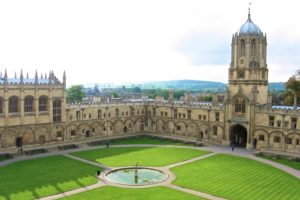
The Young Scholars Fellowship at Oxford
Legal restrictions on religious individuals and groups remain high or very high in many countries of the world, and these official obstacles are often combined with increasing social hostilities toward religion. Sometimes restrictions and hostilities rise to the level of persecution of religious minorities or even genocide. More frequently, however, such problems arise from discrimination, social marginalization, and the ordinary problems of lawmaking, enforcement, adjudication, and regulation. There is a need for a global program to identify and educate the rising generation of scholars and leaders in the field of law and religion—individuals who have the knowledge and skills to address these challenges.
With its experience in creating and supporting international academic training programs and its network of legal experts, the International Center for Law and Religion Studies (ICLRS) is committed to identifying and training the next generation of scholars in the field of law and religion through the Advanced Certificate Program on Religion and the Rule of Law at Oxford.
Each year, ten to fifteen international graduate students are admitted from human rights and comparative law backgrounds for this advanced three-week training course in international and comparative law and religion. Participants attend lectures and engage in discussions on law and religion topics, led by experts in the field. They also engage in online writing tutorials prior to the Program and individualized writing tutorials during the Program, to help participants produce a publishable English-language scholarly article. Participants have unique opportunities to present their research, network with established and emerging law and religion scholars, and receive a valuable academic credential. For more detailed information, see Program Overview.
Who Should Apply?
The Program is designed primarily for early-career academics interested in the field of religion and the rule of law from an international and human rights perspective. While the Program has a legal focus, applicants need not have a background in law. Applicants from other fields are welcome, including religious studies, human rights, international relations, politics, sociology, and history.
The following guidelines will help you determine whether you are a good fit for the Program.
- The Program is intended primarily for young professors, lecturers, and fellows, as well as advanced-level graduate students. Current employment in an academic job, or enrollment in a graduate program, is not required, however.
- Graduate students in the late stages of their PhD dissertation or master’s thesis (in a terminal-degree master’s program) are welcome to apply, but their dissertation or thesis should be on a topic related to religion and the rule of law.
- Applications are also welcome from individuals working for international organizations, religious and human rights NGOs, or organizations engaged in interfaith dialogue.
- You must have an interest in publishing scholarly work. In the months leading up to the Program, you will begin working on a scholarly article; during the Program, you will participate in intensive writing tutorials focused on readying the article for publication.
- You must be orally fluent and demonstrate an ability to do written academic work in English. Finalists will participate in a Zoom interview, where their oral fluency will be evaluated.
- Students currently in undergraduate and JD programs should not apply, but we would welcome your introducing yourself and letting us know about your future academic plans.
How to Apply?
Applications should be completed online, through the application portal below. The application will include a personal statement, a research proposal, a resume/CV, a photograph, and a letter of recommendation.
- The personal statement should explain your academic and career interests and how participating in the Program will further your career goals. The personal statement also presents an opportunity to introduce yourself and explain what you can add to the Program.
- The research proposal should be a brief explanation of an article you are writing or propose to write relating to the field of law and religion. This should be an article that you hope to publish in an English-language scholarly journal. Preference will be given to applicants who have a well-developed research-and-writing proposal.
- Your resume should summarize your academic and employment history and include academic presentations you have made as well as publications in English and other languages.
- The letter of recommendation should be from someone—preferably a senior colleague, professor, or academic advisor—who is familiar with your academic work. The recommender should be able to address your interest in and capacity to participate in an English-language academic program and to do academic research and writing in English, targeted at an international scholarly audience.
- Finalists will be notified in early February and will participate in Zoom interviews. Notifications of acceptance or nonacceptance will be distributed in the latter half of February through early March.
15 July–2 August 2024 Application
Important Dates
- Application period opens 1 December 2023 and ends 31 January 2024.
- Online writing tutorials begin April 2024.
- Coursework begins in Oxford 15 July and ends 2 August 2023
Tuition and Financial Aid
Student grants are available for admitted students who otherwise would be unable to attend. Grants cover travel, accommodation, tuition, and some food expenses.
